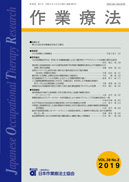Volume 38, Issue 2
Displaying 1-14 of 14 articles from this issue
- |<
- <
- 1
- >
- >|
FOREWORD
-
2019Volume 38Issue 2 Pages 127
Published: April 15, 2019
Released on J-STAGE: April 15, 2019
Download PDF (189K)
RESEARCH ARTICLES
-
2019Volume 38Issue 2 Pages 129-139
Published: April 15, 2019
Released on J-STAGE: April 15, 2019
Download PDF (692K) -
2019Volume 38Issue 2 Pages 140-150
Published: April 15, 2019
Released on J-STAGE: April 15, 2019
Download PDF (612K) -
2019Volume 38Issue 2 Pages 151-162
Published: April 15, 2019
Released on J-STAGE: April 15, 2019
Download PDF (483K) -
2019Volume 38Issue 2 Pages 163-170
Published: April 15, 2019
Released on J-STAGE: April 15, 2019
Download PDF (813K) -
2019Volume 38Issue 2 Pages 171-177
Published: April 15, 2019
Released on J-STAGE: April 15, 2019
Download PDF (482K) -
2019Volume 38Issue 2 Pages 178-186
Published: April 15, 2019
Released on J-STAGE: April 15, 2019
Download PDF (666K) -
2019Volume 38Issue 2 Pages 187-196
Published: April 15, 2019
Released on J-STAGE: April 15, 2019
Download PDF (749K)
PRACTICAL REPORTS
-
2019Volume 38Issue 2 Pages 197-204
Published: April 15, 2019
Released on J-STAGE: April 15, 2019
Download PDF (1120K) -
2019Volume 38Issue 2 Pages 205-212
Published: April 15, 2019
Released on J-STAGE: April 15, 2019
Download PDF (1047K) -
2019Volume 38Issue 2 Pages 213-221
Published: April 15, 2019
Released on J-STAGE: April 15, 2019
Download PDF (994K) -
2019Volume 38Issue 2 Pages 222-229
Published: April 15, 2019
Released on J-STAGE: April 15, 2019
Download PDF (666K) -
2019Volume 38Issue 2 Pages 230-237
Published: April 15, 2019
Released on J-STAGE: April 15, 2019
Download PDF (1730K) -
2019Volume 38Issue 2 Pages 238-246
Published: April 15, 2019
Released on J-STAGE: April 15, 2019
Download PDF (1102K)
- |<
- <
- 1
- >
- >|
